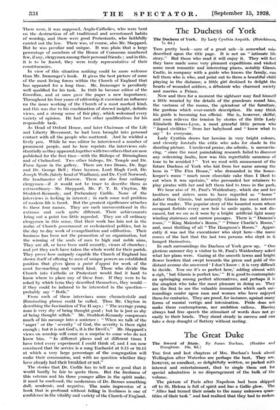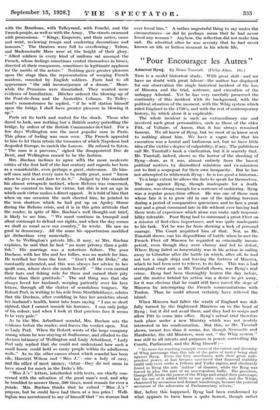The Great Duke
The Sword of State. By Susan Buchan. (Hodder and Stoughton. 10s. 6d.)
TnE first and last chapters of Mrs. Buchan's book about Wellington after Waterloo are perhaps the best. They are, however, so excellent, so delightfully written, so packed with interest and entertainment, that to single them out for special admiration is no disparagement of the bulk of the
volume.
The picture of Paris after Napoleon had been shipped off to St. Helena is full of spirit and has a Gallic glow. The " Allies had turned their minds to the many unknown quan- titiesof their task " and had realized that they had to reckon with the Bourbons, with Talleyrand, with Fouche, and the French people, as well as with the Army. The streets swarmed with processions. " Kings, Emperors, and their suites, came and went, reviewing troops and conferring decorations and honours." The theatres were full to overflowing ; Tabus, and Mademoiselle Mars were at the height of their glory. " Allied soldiers in every kind of uniform sat amongst the French, whose feelings sometimes vented themselves in hisses, directed at their conquerors, sometimes in legitimate applause for the merits of the actors." Nothing gave greater pleasure upon the stage than the representation of weeping French maidens, consoled by English soldiers. Paris had to all appearance " the odd inconsequence of a dream." Mean- while the Prussians were dissatisfied. They wanted more evidence of humiliation. Bliicher ordered the blowing up of the Pont-de-Jena and the Austerlitz Column. To Talley- rand's remonstrance he replied, " if he will station himself upon the bridge I shall have greater pleasure in blowing it Paris set its teeth and waited for the shock. Those who dared to look, saw nothing but a British sentry patrolling the bridge, by orders of the British Commander-in-Chief. For a few days Wellington was the most popular man in Paris. This phase of feeling was soon over. The French appealed to him to let them retain the treasures of which Napoleon had despoiled Europe, to enrich the Louvre. He refused to listen. " The man is a parvenu," sighed the disappointed Duc de Beni, and Wellington ceased to be the fashion.
Mrs. Buchan inclines to agree with the more moderate critics of the first half of the last century and regards her hero as a considerable, even perhaps a great, statesman. He him- self once said that every man to be really great, must " know when to give in and dare to do it." Judged by this standard his almost retrograde instinct, where Reform was concerned, may be counted to him for virtue, but this is not an age in which such virtue makes a direct appeal. It is told of him that when on one occasion the mob cheered him, he pointed to the iron shutters which he had put up on Apsley House during the Reform crisis, and it is in this grim attitude that the reader, in spite of Mrs. Buchan's well thought-out brief, is likely to see him. " We must continue in tranquil and silent contempt to defend our rights, and when the day comes we shall as usual save our country," he wrote. He saw no good in democracy. All the same his opportunism modified his diehardism very materially.
As to Wellington's private life, it may, as Mrs. Buchan explains, be said that he had " no more privacy than a gold- fish." His marriage was a notorious failure. The poor Duchess, with her fibs and her follies, was no match for him. He terrified her from the first. " Don't tell the Duke," she constantly reiterated, and this was always her advice to her spoilt sons, whose slave she made herself. " She even carried their bats and fishing rods for them and earned their pity rather than their gratitude." The sad thing was that she always loved her husband, weeping patiently over his love letters, through all the clatter of scandalous tongues. Sir Robert Peel, in writing to his wife from Strathfieldsaye, relates that the Duchess, after confiding in him her anxieties about her husband's health, burst into tears saying " I am so short sighted, that I cannot remark his features. I can only judge of his colour, and when I look at that precious face it seems to be very pale."
As to the Mrs. Arbuthnot scandal, Mrs. Buchan sets the evidence before the reader, and leaves the verdict open. Not so Lady Peel. When Sir Robert wrote of the large company among whom he was staying at Sudbourne, and alluded to the obvious intimacy of Wellington and Lady Arbuthnot, " Lady Peel only replied that she could not understand how such a small house could hold so many people within its adulterous walls." As to the other names about which scandal has been rife, Harriett Wilson and " Miss J."—one a lady of easy, and the other of most uneasy, virtue—they do not seem to have stood for much in the Duke's life.
" Miss J.'s " letters, interlarded with texts, are chiefly con- cerned with the salvation of the great man's soul, and why he troubled to answer them, 390 times, must remain for ever a puzzle. Mrs. Buchan thinks that he valued " Miss J.'s " prayers, but he could have had them at a less price ! Well- ington was-accustomed to say of himself that " no woman had ever loved him." A rather ungrateful thing to say under the circumstances—or did he perhaps mean that he had never loved any woman ? Anyhow, the reflection did not make him sad. He admitted after he was seventy that he had never known an idle or listless moment in his whole life.







































 Previous page
Previous page